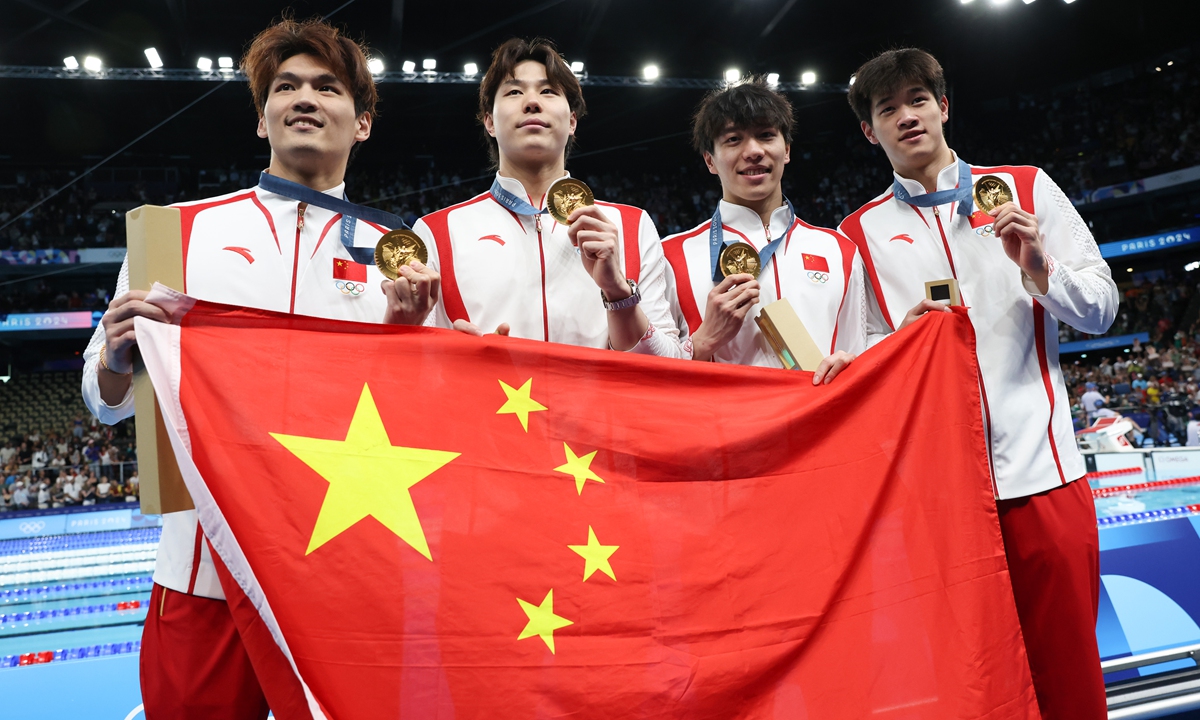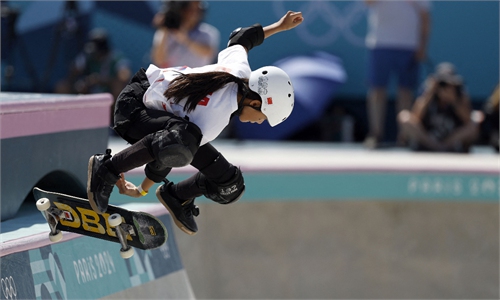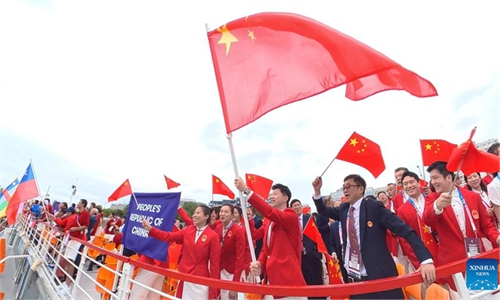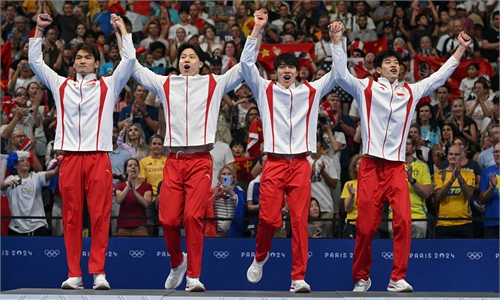Made-in-China sports exports surge amid Paris Olympics, showcasing China’s strong innovation, manufacturing capability
Chinese sports products set to show new competitiveness empowered by AI, other technologies: experts

(From left) Chinese swimmers Xu Jiayu, Qin Haiyang, Sun Jiajun and Pan Zhanle pose for a photo with their gold medals during the awards ceremony for the men's 4x100m medley relay at the Paris Olympics on August 4, 2024. Photo: VCG
From hydrofoils to small table tennis balls, made-in-China products are in the spotlight at the Paris Olympic Games, showcasing China's industrial advantages and strong manufacturing capability. Thanks to the event, Chinese sportswear companies continue to go global, reporting a surge in their sports equipment exports.
Chinese observers said that traditional Chinese products will show new international competitiveness in the future, empowered by technologies such as artificial intelligence (AI) and big data, while stressing that it is impossible for the West to "decouple" from China as advocated by some US politicians.
"All of the hydrofoils used at the Paris Olympic Games were made by our company," Yan Zaixing, general manager of Sonic Composite (Hubei) Co, based in Jingzhou, Central China's Hubei Province, told the Global Times on Sunday.
According to Yan, the company uses recyclable materials to make hydrofoils, and it also independently developed 3D scanning machines to enhance product precision while using robots to polish the boards, to ensure athletes' performances.
"Relevant equipment for the Olympics in 2028 is basically confirmed to be produced by us, with documents in the process of being signed," Yan said.
K-Power Sports, a sports equipment maker in Xiamen, East China's Fujian Province, is among the Chinese companies that made huge profits amid the buzz of the 2024 Paris Olympic Games.
Between January and July, our company's exports of sports products and equipment posted significant growth, with the total value exceeding 200 million yuan ($27.9 million), up over 60 percent year-on-year, Wei Zhaogui, the company's general manager, told the Global Times on Sunday.
Wei attributed the growth to rising global interest in sports sparked by the Paris Olympics. The company makes more than 600 products in 13 categories of fitness equipment, such as exercise bikes, treadmills and stepper machines. The products are sold in more than 100 countries and regions in Europe, Asia and Africa.
"It's encouraging to see a lot of made-in-China sports equipment, facilities and AI-powered cloud technology appear at the Paris Olympic Games, which indicate that technology-empowered traditional Chinese products are showing new competitive advantages," He Weiwen, a senior fellow at the Center for China and Globalization, told the Global Times on Sunday.
Thanks to the strong production capability, advanced manufacturing processes and mature supply chains of China's manufacturing sector, the country is expected to provide more high-quality products and services to the world, He said.
According to the WTO, China has long been the most significant exporter of sports goods worldwide, accounting for a remarkable 43 percent of global exports in 2022. At that point, China's exports of racket products were particularly notable, representing 63 percent of world exports.
The US has been the largest importer of sports goods since 2010, accounting for 31 percent of the world's imports in 2022. The EU came next with 22 percent, followed by Japan and the UK with equal shares of 6 percent, the data showed.
The highly intertwined nature of the global sports industry shows that it is absurd and false for some Western politicians, especially from the US, to hype so-called "decoupling" from China, He said, stressing that no one can change the closely connected global industrial and supply chains.
In July, UK Trade Secretary Jonathan Reynolds signaled he was not about to follow the EU's lead in imposing tough tariffs on Chinese electric vehicle imports, while the US announced recently it would postpone increased tariffs on Chinese imports for at least two weeks.
Although Washington's "small yard, high fence" policy brings difficulties and uncertainties to China's foreign trade, the US cannot shake China's important place in global industrial and supply chains, He said.



